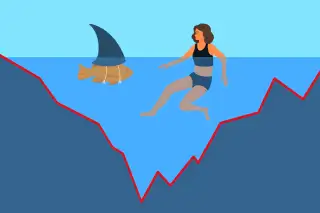Wall Street Is Worried About a Recession. What Happens to the Stock Market if There Isn't One?

Wall Street experts have been warning for the better part of a year that the U.S. will enter a recession in 2023. What happens to the stock market if that does — or doesn’t — happen?
Various surveys show economists see at least a 60% chance of a recession in the next 12 months. One historically reliable predictor of past recessions — The Conference Board Leading Economic Index — is pointing to a recession that may have already begun. Dire forecasts for the economy, along with decades-high inflation, help explain why the U.S. stock market is coming off its worst year since 2008.
But not everyone is on the same page. Goldman Sachs economists, who peg the probability of a downturn at just 35%, believe a recession could be avoided altogether.
Here’s what investors should know about what a recession, or no recession, would mean for the stock market.
What economic uncertainty means for the stock market
After a year when the S&P 500, a benchmark for U.S. stocks, plummeted nearly 20%, many investors are eager for relief. But market watchers caution it may be too early to expect stock prices to surge higher until investors have a better sense of both the timing and severity of a potential recession.
That’s because stock prices and the economy rarely move in the same direction at the same time. Instead, market participants try to predict the pace of economic growth some six to 12 months in advance, explains Liz Young, head of investment strategy at SoFi. That means a low during the market’s recession-era selloff could significantly predate the end of the economic downturn, she adds.
Wall Street still broadly expects a recession this year and it will likely be months before it’s obvious if a downturn is a foregone conclusion or avoidable — which means the fate of stocks will hang in the balance in the meantime, Young says.
“That kind of uncertainty is going to serve as a brick on the market’s head,” she adds.
Is a recession priced into stock prices?
Given that forward-looking view of the market, there’s been some debate on Wall Street about whether stocks already reached a recession-fueled bottom. At its worst, the S&P 500 was down more than 25% in October 2022 from an all-time high earlier in the year.
The 2022 selloff in the S&P 500 reflected some, though not all, of the risk of a recession, according to Rob Haworth, senior investment strategist at U.S. Bank. If a recession is eventually deemed to be imminent and inevitable, he adds, investors may need to further lower their expectations for corporate profits — and, in turn, stock prices.
Historically, the S&P 500 has fallen about 30% during an average bear market — generally defined as a period when a stock or stock index falls at least 20% from its most-recent high, says Jeff Buchbinder, chief equity strategist at LPL Financial. And most bear markets overlap with recessions, he adds.
While the market’s decline in 2022 didn’t reach that 30% threshold, the extent of the declines suggests that, barring a more severe economic downturn than most of Wall Street is currently expecting, investors may have already endured the worst of a recession-related market selloff, Buchbinder notes.
“We’ve priced in a fair amount of bad news," he says.
What if the economy sidesteps a recession?
But there is the potential the economy could avoid a recession altogether this year. Buchbinder estimates a roughly 20% probability that no recession materializes if some of the factors “line up,” including that the economy strengthens, inflation falls and the Federal Reserve pauses its aggressive interest rate hikes. And a non-recession could be accompanied by a rally in the S&P 500 in the range of 15% to 20% this year, Buchbinder adds.
Similarly, Haworth says one challenge in predicting a recession is that much of the risk is driven by the Fed’s policy response to curb inflation rather than what’s happening in the labor market and other parts of the economy.
What’s tricky about this stage of the economic cycle is investors are still searching for reasons to either confirm or deny a recession is looming, Young notes. And until there are clear signs a recession has been averted, she believes the market will be constrained.
“There’s a limit to how high it can go,” she adds.
More from Money:
Here’s What Investing Experts Are Watching in 2023, From Inflation to China’s Economic Reopening